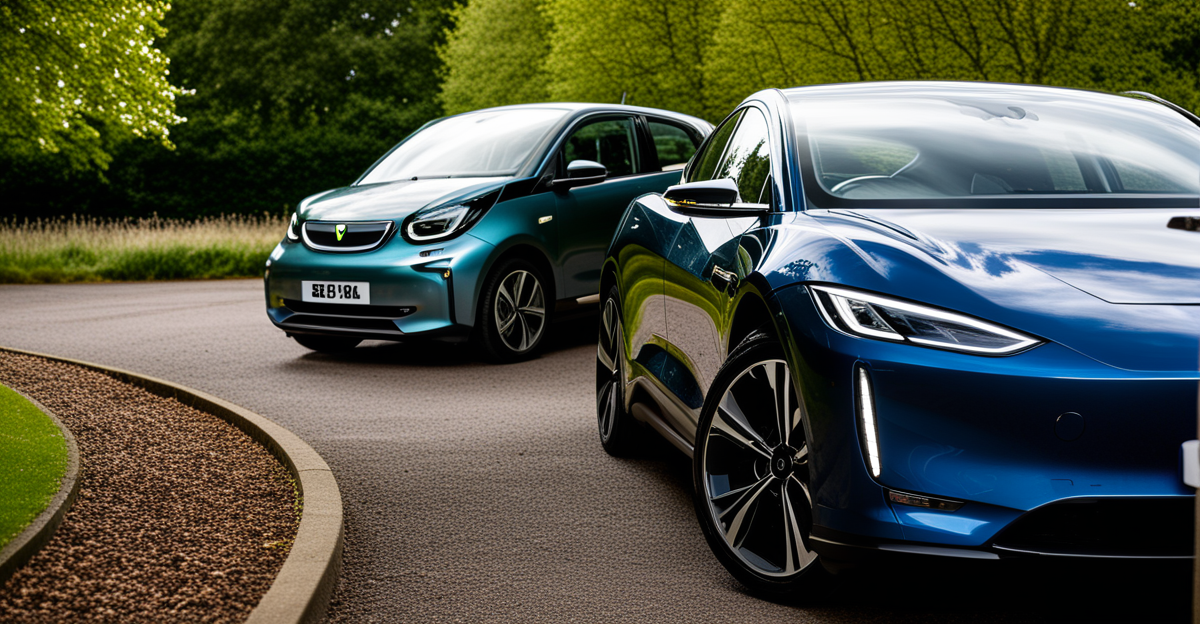Immediate Economic Impacts on the UK Automotive Sector
The electric vehicles UK market is driving significant shifts in the automotive industry impact, with rapid growth in demand for EVs reshaping traditional dynamics. Recent market data shows a steady increase in electric vehicle sales, reflecting changing consumer preferences towards cleaner technologies. This trend directly affects manufacturing, as production of internal combustion engine (ICE) vehicles declines to accommodate the growing EV market.
UK automakers are experiencing notable changes in financial performance due to this shift. Many are increasing investments in EV development, aiming to capture emerging market opportunities. However, the transition also brings challenges, such as managing legacy ICE production lines while investing in electric vehicle UK advancements.
Additional reading : Will Electric Cars Transform the Future of the UK Automotive Industry?
Consumer demand trends in the EV market influence company strategies broadly, encouraging innovation and expanding the UK’s role as a competitive hub for electric vehicles. This ongoing transformation highlights crucial economic implications as the sector adapts to new technologies, regulatory pressures, and market demands, emphasizing the UK automotive industry’s pivotal role in the global EV transition.
Changes in Manufacturing and Supply Chain Dynamics
The rise of EV manufacturing UK is fundamentally transforming automotive production lines. Traditional assembly plants are being upgraded or repurposed to handle the specialized requirements of electric vehicles. These changes include integrating high-voltage systems and battery pack assembly, which differ significantly from internal combustion engine (ICE) assembly processes.
In parallel : What Are the Key Challenges Facing the Future of UK’s Automotive Industry?
A key focus within the electric vehicle supply chain is battery production and sourcing. UK manufacturers now prioritize securing raw materials and establishing domestic battery gigafactories to reduce dependence on global suppliers. This reshapes supply logistics and emphasizes local partnerships, creating a more resilient supply chain tailored for EV market demands.
Collaborations between automakers, technology firms, and suppliers have increased. These partnerships accelerate innovation in areas such as electric drivetrains and battery management systems, helping the UK automotive sector adapt swiftly to new production standards. Such cooperation also supports workforce training and facility modernization, accelerating the transition and boosting the overall efficiency of the EV manufacturing UK ecosystem.
Employment Trends and Workforce Transformation
The shift to electric vehicles UK is reshaping automotive jobs UK, creating both challenges and opportunities. As traditional internal combustion engine roles decline, demand for skills in battery technology, electric drivetrains, and software integration rises. This shift requires substantial workforce upskilling to equip current employees with competencies relevant to EV manufacturing and maintenance.
UK automakers and training providers are launching targeted reskilling initiatives. These programs focus on electric powertrain assembly, high-voltage safety protocols, and advanced diagnostics. For instance, suppliers and manufacturers collaborate to design apprenticeships specifically oriented toward EV production.
The EV employment impact also varies regionally. Areas historically reliant on ICE manufacturing face greater job transitions, while regions hosting new EV facilities experience growth in technical roles. Workforce transformation is essential to avoid skill gaps that could disrupt the broader automotive industry impact in the UK.
By proactively addressing these employment trends and investing in workforce development, the UK aims to maintain a competitive edge in the EV market trends, aligning people strategies with evolving industry demands.
Regulatory Landscape and Government Policy Influence
UK EV regulations are central to shaping the electric vehicles UK market and driving the automotive industry’s swift transition. The government has set ambitious zero-emission vehicle mandates, targeting the phasing out of new petrol and diesel cars by 2030. These mandates are reinforced by clear timelines that provide manufacturers with a predictable framework, encouraging sustained investment in EV development.
Fiscal incentives are a crucial part of government policy, including grants for EV purchases and tax benefits for both consumers and manufacturers. These incentives reduce upfront costs, directly influencing consumer adoption rates and shaping EV market trends.
Regulatory compliance pressures push automakers to innovate and align with environmental standards. Simultaneously, government support programs fund research and infrastructure, facilitating a smoother transition across the sector. This dual approach balances enforcement with assistance, enabling the UK automotive sector to capitalize on regulatory changes while maintaining competitiveness.
Overall, government policies act as a catalyst for industry transformation, fostering growth in the electric vehicles UK space and reinforcing the UK’s position as a leader in sustainable automotive innovation.
Immediate Economic Impacts on the UK Automotive Sector
The surge in electric vehicles UK demand is reshaping the automotive industry impact profoundly. Consumer preference is shifting noticeably from internal combustion engine (ICE) vehicles to EVs, driving a significant decline in traditional vehicle sales. This transition compels manufacturers to reallocate investments toward EV research and development, causing a strategic pivot in financial performance.
Market data reveals that EV sales in the UK are increasing year-over-year, indicating strong uptake aligned with broader EV market trends. This growth affects production volumes, with many UK automakers reducing ICE output while expanding electric vehicle UK capacity. The reconfiguration impacts not only manufacturer revenues but also supply chain economics, labor requirements, and long-term competitiveness.
Investors recognize these shifts, with capital increasingly directed toward battery technology and electric drivetrains. Automakers face the challenge of balancing legacy operations with costly yet necessary investment in EV manufacturing infrastructure. Adapting to evolving consumer demand signals a critical economic realignment within the UK automotive sector, reinforcing the nation’s position as a key player in global electric vehicle adoption.
Immediate Economic Impacts on the UK Automotive Sector
The surge in electric vehicles UK adoption is markedly reshaping the automotive industry impact through substantial shifts in consumer preferences. Market statistics reveal a pronounced year-on-year increase in EV sales, which directly influences the decline in traditional internal combustion engine (ICE) vehicle manufacturing and sales. Precise data indicates that many consumers prioritize environmental benefits and technological advancements, accelerating this transition and redefining EV market trends.
UK automakers are reallocating capital toward electric mobility, recognizing the long-term benefits despite upfront costs. This financial shift includes substantial investments in battery technology and EV design, reflecting a commitment to meeting new market demands. Companies must balance legacy ICE operations with these emerging priorities, affecting profitability and strategic planning.
The evolving landscape encourages innovation but also challenges firms to optimize supply chains and production methods for electric vehicles. As a result, the automotive industry impact extends beyond manufacturing to influence regional economies and employment. Monitoring these developments using precise metrics allows stakeholders to understand ongoing economic transformations rooted in electric vehicles UK evolution and its broader market significance.
Immediate Economic Impacts on the UK Automotive Sector
The surge in electric vehicles UK adoption is redefining the automotive industry impact through notable shifts in consumer demand, with a clear trend favoring EVs over traditional vehicles. Market data shows consistent growth in EV sales, driven by environmental awareness and technological advances, which is reshaping EV market trends and causing a decline in internal combustion engine (ICE) vehicle manufacturing. This decline impacts not only production volumes but also the supply chain and labor markets linked to ICE vehicles.
Financially, UK automakers are channeling significant investments into EV technology, including battery development and electric drivetrains, aiming to keep pace with evolving regulatory landscapes and consumer preferences. This focus challenges firms to balance legacy ICE operations while expanding EV production capacity, affecting profitability and strategic resource allocation. As a result, the sector faces a realignment where innovation and sustainability increasingly define competitive advantage in the electric vehicles UK market.
Immediate Economic Impacts on the UK Automotive Sector
The adoption of electric vehicles UK is driving measurable shifts in the automotive industry impact with notable changes in market dynamics. Sales data reveals a surge in EV purchases, directly influencing a decline in traditional internal combustion engine vehicle production. This shift triggers adjustments in manufacturing output, affecting supply chains and regional economies tied to ICE vehicles.
Financially, UK automakers are reallocating capital to align with EV market trends, investing heavily in battery technology, electric drivetrains, and related R&D. Such investments reflect anticipation of regulatory pressures and growing consumer demand favoring electric over traditional vehicles. As a result, companies face the challenge of balancing legacy ICE operations with expanding EV production, which impacts short-term profitability but offers long-term strategic benefits.
This economic realignment extends beyond manufacturing to influence employment patterns and supplier networks, signaling deep structural change. Precise analysis confirms these trends shape competitive positioning and innovation focus within the electric vehicles UK market. The evolving environment underscores the need for a coordinated approach among manufacturers to capitalize on shifting consumer preferences while managing transitional costs effectively.








